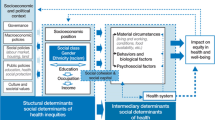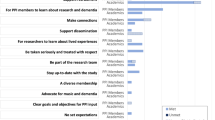Abstract
User participation has been embraced worldwide as a means to provide better consumer outcomes in health and community care. However, methodologies to achieve effective consumer engagement at the programme design level have remained under-explored. The purpose of this study was to evaluate the impact of a Participatory Action Research (PAR)-inspired methodology used to develop a consumer-directed community care/individualised funding service model for people with disabilities. A retrospective analysis of case notes and internal reports for the first 6 years of an ongoing project were examined. The findings suggest that PAR methodologies need to take into account community development, group support, and capacity building as well as succession planning and risk management issues in order to facilitate the often lengthy policy and project development process. Drawing on these findings, this article discusses five lessons and their methodological implications for PAR in a health or social policy/programme design context.
Similar content being viewed by others
Notes
Programmes based on the philosophy of CDC, a term that emerged within the North American context, are elsewhere known under names such as flexible funding, individualised funding, self-management, cash for care, and independent living.
References
Administration on Ageing (2006) Choices for independence: modernizing the older Americans act, Department of Health and Ageing
Blackman D (2007) Framework for individualized funding—draft for release. Saskatchewan Community Living Division, Canada
Bolton B, Brookings J (1996) Development of multifaceted definition of empowerment. Rehabil Couns Bull 39:256–264
Braye S (2000) Participation and involvement in social care. In: Kemshall H, Littlechild R (eds) User involvement and participation in social care. Philadelphia Jessica Kingsley, London
Bruyère SM (1993) Participatory action research: overview and implications for family members of persons with disabilities. J Vocat Rehabil 3(2):62–68
Burns D (2007) Systemic action research. The Policy Press, London
Commission for Social Care Inspection (2006). Real voices, real choices: the qualities people expect from care services (issue 2), England
Department of Health (2006) Our health, our care, our say: a new direction for community services (white paper). Older People and Disabilities Division, Department of Health, England
Emener WG (1991) An empowerment philosophy for rehabilitation in the 20th century. J Rehabil 57(4):7–12
Kemshall H, Littlechild R (2000) User involvement and participation in social care. Philadelphia, Jessica Kingsley, London
Kendrick M (1996) The natural authority of families. CRUcial Times, 6(July):6
Kendrick M (2001) Family governed flexible family support: the Massachusetts small project example. Paper sponsored by Massachusetts families organizing for change and uniting families for change of Western Massachusetts
Kosciulek JF (2000) Implications of consumer direction for disability policy development and rehabilitation service delivery. J Disabil Policy Stud 11(2):82–89
Laragy C (2004) Individualised funding/family governed project: evaluation of a pilot project conducted by Uniting Care Community Options. The University of Melbourne, Melbourne
Laragy C (2008) Individualised lifestyles project: follow-up evaluation 2007. LaTrobe University/Uniting Care Community Options, Melbourne
Lord J, Hutchinson P (2003) Individualized support and funding: building blocks for capacity building and inclusion. Disabil and Soc 18(1):71–86
Mahoney KJ, Desmond SM et al (2002) Consumer preferences for cash options versus traditional services: telephone survey results from New Jersey elders and adults. J Disabil Policy Stud 13(2):75–87
Moseley C (2001) Balancing safety and freedom in consumer-directed systems of support. Robert Wood Johnson Foundation/University of New Hampshire, New Hampshire
National Council on Disability (1996) Achieving independence. J Disabil Policy Stud 7(2):57–65
National Institute on Consumer Directed Long Term Services (1996) The benefits of consumer direction. Consumer Choice News 1(2):1–3
Ottmann G, Street AF (2007) Ten lessons for developing a health information website. Aust Health Rev 31(4):523–526
Parent W (1993) Quality of life and consumer choice. In: Wehman P (ed) The ADA mandate for social change. Brookes, Baltimore
Phillips B, Schneider B (2004) Changing to consumer-directed care: the implementation of the cash and counseling demonstration in Florida. Mathematica Policy Research, Princeton
Phillips B, Mahoney K et al (2003) Lessons from the implementation of cash and counseling in Arkansas, Florida, and New Jersey. Mathematica Policy Research, Princeton
Shakespeare T (2006) Disability rights and wrongs. Routledge, London
Simon-Rusinowitz L, Bochniak AM et al (2000) Implementation issues for consumer-directed programs: a survey of policy experts. Generations 24(1):34–40
Simon-Rusinowitz L, Mahoney K et al (2005) The cash and counseling demonstration and evaluation: focus group inform design of a consumer directed cash option. Care Manage J 6(2):56–65
Turnbull HRI, Turnbull AP (1991) Participatory action research and public policy. Kansas University, Lawrence Beach Center on Families and Disability, Lawrence
Ungerson C, Yeandle S (2007) Conclusion: dilemmas, contradictions and change. In: Ungerson C, Yeandle S (eds) Cash for care in developed welfare states. Palgrave Macmillan, Basingstoke, pp 187–207
White GW, Suchowierska M et al (2004) Developing and systematically implementing participatory action research. Arch Phys Med Rehabil 85(2):3–12
Acknowledgment
The authors would like to thank an unnamed reviewer for her/his constructive comments on a previous draught.
Author information
Authors and Affiliations
Corresponding author
Rights and permissions
About this article
Cite this article
Ottmann, G., Laragy, C. & Damonze, G. Consumer Participation in Designing Community Based Consumer-Directed Disability Care: Lessons from a Participatory Action Research-Inspired Project. Syst Pract Action Res 22, 31–44 (2009). https://doi.org/10.1007/s11213-008-9110-z
Published:
Issue Date:
DOI: https://doi.org/10.1007/s11213-008-9110-z




